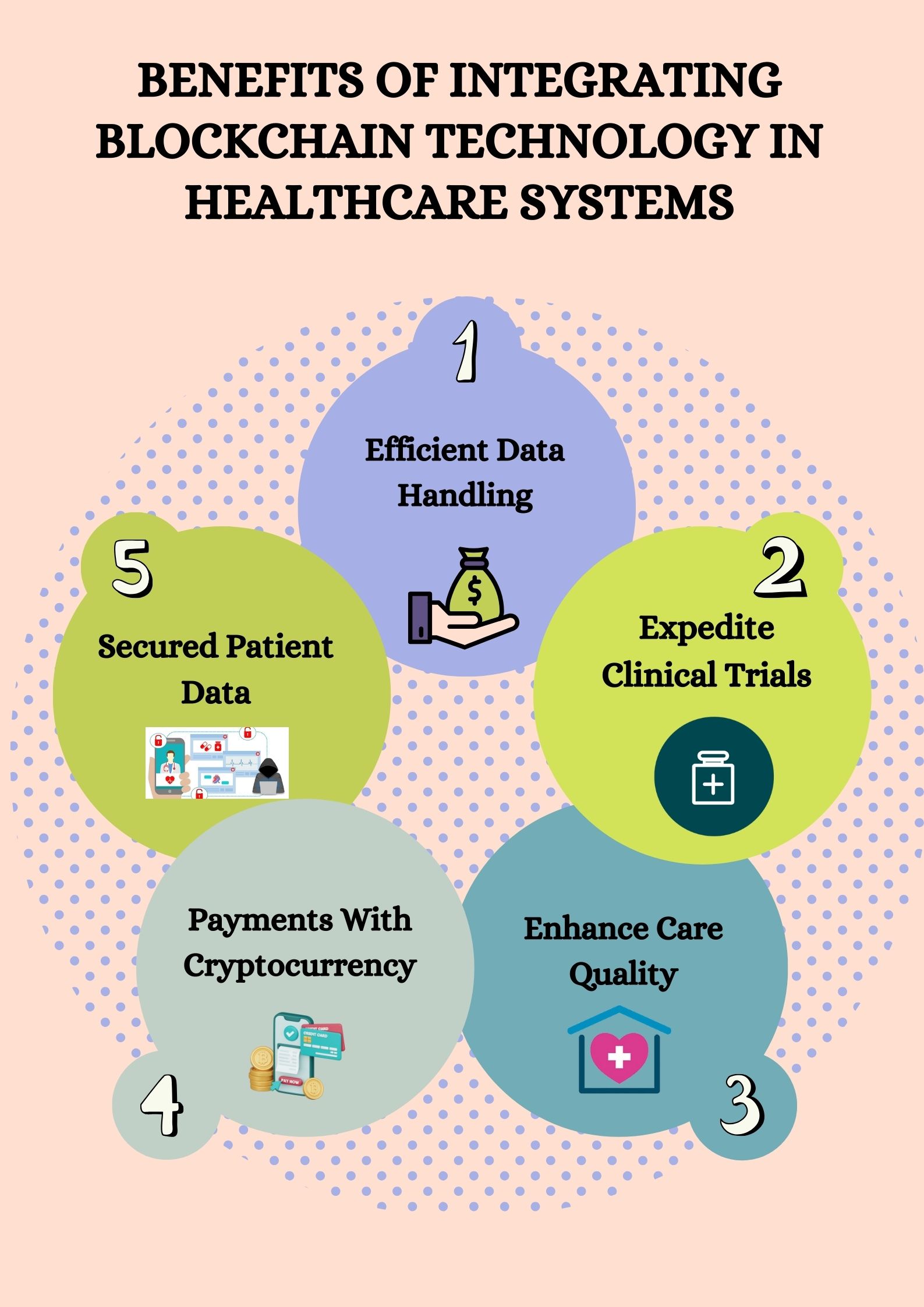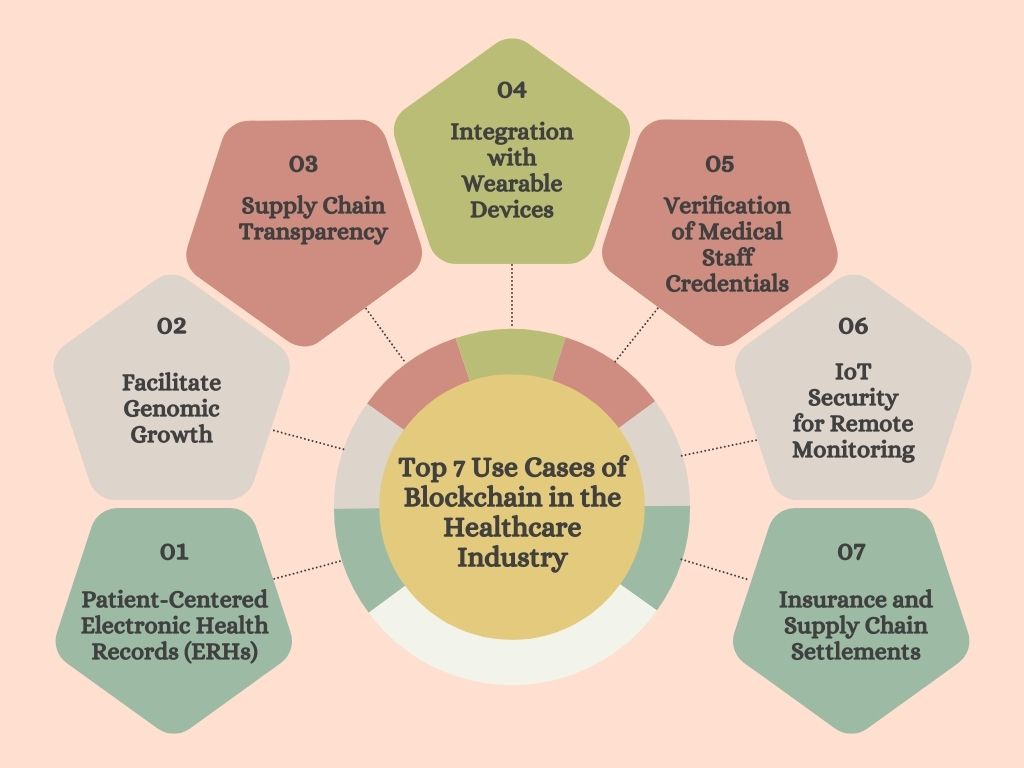High maintenance and administrative expenses are critical problems that the contemporary healthcare system faces. The healthcare ecosystem is extremely intricate, comprising many verticals, each including doctors, patients, researchers, practitioners, support staff, and management personnel. Due to this, the classification and management of patient data becomes a difficult task. This difficulty is compounded by the fact that various healthcare verticals have diverse data structures and operations. For these reasons, the ineffective interchange of health-related information among diverse healthcare verticals offers a massive impediment.
Blockchain in healthcare offers remarkable potential in rectifying security-related issues and the concern of vast and highly complex data. Since conventional electronic health records (EHRs) and personal health records systems have been unsuccessful in dealing with privacy and security-related concerns, healthcare institutions and business owners are looking forward to blockchain app development.
What is Blockchain Technology?
A blockchain is a collection of blocks connected by a hashing algorithm. Each link in the chain consists of time-stamped data records containing sensitive, financial, and private information that needs to be kept private. All data is available to users on a distributed ledger to improve transparency. Moreover, all private information is encrypted using RSA-256 and other cryptographic techniques.
As the healthcare sector was the first to transform following the pandemic, blockchain was soon selected as the preferred solution for increased security, better patient outcomes, and broader service accessibility. There are now several blockchain applications in healthcare that have the potential to significantly improve the security, effectiveness, accessibility, and dependability of health data systems.
Benefits of Integrating Blockchain Technology in Healthcare Systems

Blockchain provides numerous benefits for the healthcare industry, such as improved data security, transparency, and effective claims processing. Let’s look at the top benefits of blockchain in healthcare.
-
Efficient Data Handling
A blockchain is ideal for mitigating problems in traditional workflows when collaborating on big infrastructure projects. Its decentralized nature resolves the issue of improved data dispersion. It enables medical facilities and organizations to demonstrate how to protect patient privacy and provide access to data management.
Clinics could manage healthcare databases efficiently by implementing international compliance, such as HIPAA. A Blockchain app development company can build medical applications while ensuring all necessary rules are followed for sustainability and customer trustworthiness.
- Expedite Clinical Trials
Clinical trials generate massive amounts of data and include many individuals, such as physicians, sponsors, hospitals, clinics, drug manufacturers, researchers, etc. This raises the chances of mistakes and deliberate forgery. Reports indicate that over 80% of cancer patients engage in clinical trials, and the data is saved in centralized databases.
Therefore, you can integrate blockchain technology in healthcare to make the clinical trial procedure more transparent. It enables researchers to analyze studies with protocols and forbid their publication. This technology also allows all healthcare-related documents to be conveniently stored. For more help, you can hire Blockchain app developers. They will be able to assist you better in developing blockchain-based solutions.
-
Enhance Care Quality
Numerous security layers are necessary in the healthcare industry to ensure the security of patient data. For this reason, contemporary security systems use blockchain technology to increase patient safety. Because of blockchain protection, digital fraud has already been avoided, and trust has grown.
Doctors do not have to constantly contact patients to review their entire medical history because patients can provide access to their sensitive data only if they want it. This improves patient treatment and streamlines care facilities.
-
Payments With Cryptocurrency
Healthcare institutions can create data-portable and interoperable digital medical solutions using the blockchain ledger. Hospitals, governments, pharmacies, and research institutes are among the many healthcare organizations currently using blockchain’s two- or three-layer security and authentication features. This facilitates businesses in building a safer and more practical method of carrying out medical procedures.
The cryptocurrency method enhances the payment process’s accountability and facilitates payments more quickly and easily. Blockchain-based payment systems for healthcare enable efficient payment management, invoice sending, cost reduction, enhanced patient experience, and easier front desk jobs.
-
Secured Patient Data
Patient data security is one of blockchain’s main benefits in the healthcare industry. As a result, healthcare intuitions and clinics are now future-proofing patient records using smart contracts. This ensures that the data is safe from fraud and minimizes the difficulties that physicians and hospital management systems have in diagnosing the patient’s illness.
According to recent studies, over 176 million patient records were breached from 2009 to 2017. The hackers also took financial and credit card information, which they used for fraud. The blockchain is a distributed, immutable, and tamper-proof technology, making hacking nearly impossible.
Also Read: A comprehensive guide to healthcare app development cost
Top 7 Use Cases of Blockchain in the Healthcare Industry

Blockchain in the healthcare industry has many use cases, from improving patient data management to medical supply chain management and healthcare payment. Below, we have mentioned the top use cases of blockchain in the healthcare industry.
-
Patient-Centered Electronic Health Records (ERHs)
The issue of data silos is one that clinics and healthcare institutions worldwide are facing. This implies that each time a patient visits a doctor, the doctor and patient only have a partial overview of each other’s medical history. This tends to result in treatment errors, making the process more difficult and time-consuming.
According to a 2016 Johns Hopkins University study, medical errors resulting from poorly coordinated care such as incomplete or missing planned actions inaccurately entered patient medical histories, or a lack of prior treatment data—were the third most common cause of death in the United States.
- Facilitate Genomic Growth
Genomic sequencing costs decreased from $10,000 to $1,000, and some companies claim to do the task for around $200. These kinds of activities empower professionals and scientists to participate in genome-related research. However, the main question is where and how to secure such a large dataset. This is where blockchain for healthcare becomes helpful.
Blockchain enables participants to save and store billions of genome data points, maintain ownership, and exchange them safely with other parties. You can easily monetize your genomic information without including mediators. The best aspect is that the blockchain app development cost remains under budget, so business owners do not have to spend much on development.
-
Supply Chain Transparency
One of the most significant challenges facing the healthcare industry is ensuring the provenance of medical goods to assure validity. A blockchain-based system can facilitate tracking goods from the producer to the pharmacy or clinic. Throughout the process, supplies may be traced, giving all involved parties complete visibility and transparency over the products patients purchase and receive.
This has swiftly risen to the top of the healthcare domain’s priority list, particularly in developing countries, where fake prescription drugs cause millions of deaths a year. Due to the rapid proliferation of medical equipment, blockchain is becoming increasingly popular in the supply chain for these devices, attracting more hackers.
-
Integration with Wearable Devices
One of blockchain’s most outstanding abilities is its use with wearable Internet of Things devices. Blockchain can offer an efficiently authenticated, secure platform to incorporate data with wearable devices like fitness, health, or activity trackers. Just like patients, even physicians and healthcare professionals can access this secured and updated data. With that, doctors can easily track patients’ health progress anytime. Therefore, you must focus on a unique healthcare app development as the usage of wearable devices is skyrocketing daily.
-
Verification of Medical Staff Credentials
The blockchain ledger is also used to track the qualifications and experience of medical experts. It allows leading healthcare organizations to record staff members’ credentials, making monitoring and validating expertise and degrees easy. These systems have already been established; the US ProCredEx credential verification system, which uses the R3 Corda blockchain technology, is among many examples.
-
IoT Security for Remote Monitoring
Remote monitoring technologies are a critical use case of blockchain in healthcare. These technologies remotely take a patient’s vital signs and deliver additional information about the patient’s health-related data to healthcare professionals. It is currently one of the most significant developments in the healthcare industry, enabling more proactive and preventive treatment.
-
Insurance and Supply Chain Settlements
Blockchain is most commonly used in supply chain settlements and insurance. Numerous businesses provide blockchain-based systems that make it simple for different organizations, including insurance companies, clinics, pharmaceutical firms, and medical device manufacturers, to validate their identities. These identities may record contract information, monitor service transactions, and handle payment settlements for products and services. Blockchain-based ecosystems enable trading partners and insurance companies to operate on fully digital and, in certain situations, automated contract terms.
Conclusion
According to IBM, about 70% of healthcare organizations believe better clinical trial administration would be the critical outcome of integrating blockchain technology into the healthcare industry. This is because blockchain technology provides an efficient decentralized structure and regulatory compliance that makes electronic health record (EHR) sharing possible.
AI software development in healthcare needs more efficient and convenient payment methods, data security, and high-quality care. Consequently, blockchain resolves most of these problems by providing access to store, share, and manage data, which is essential for the industry’s operations.
Blockchain app development is a complex task, though. Healthcare is even more complicated because businesses must adhere to many compliance and data-related regulations. Therefore, looking for an experienced and reliable HIPAA compliance application development company is essential. However, before selecting the company, you must check its past clients, testimonials, case studies, and expertise.



